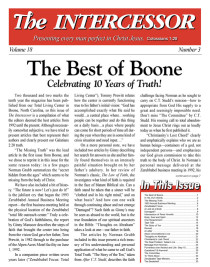
Thoughts on Abraham
Thoughts on Abraham, by Sanda Cooper
Abrahams willingness to sacrifice Isaac is one of the greatest examples of faith in the Bible, as it was through this child whom God had promised that the nation of Israel was born. This article is particularly timely in light of the events of September 11, 2001, as it was Abrahams unfaith in Gods promise that led to the birth of Ishmael, his son by the maidservant Hagar, which in turn gave us the Arabs. Thus began thousands of years of bloodshed that continues on to this day.
A friend of mine sent me an excerpt about the sacrifice of Isaac from a book by Elie Wiesel, the Jewish concentration camp survivor and author. I had been reading Fear and Trembling, Kierkegaards account of the same story. The difference between the two is marked.
Elie Wiesel calls Isaac the most tragic of our ancestors, which puzzles me, as I would call him one of the most triumphant evidences of the power of faith in God prior to Christ Himself. Isaac and Jesus have similar roles. God, in fact, asked Abraham to do nothing He Himself had not done. God promised that the nation of Israel was to come into existence through Abrahams seed, Isaac, and yet God said to sacrifice him. Mankind was to be saved from eternal separation from God through Jesus Christ, yet He was crucified. Abraham so believed Gods promise that he acted, as Kierkegaard says on the strength of the absurd, and believed that even if he killed Isaac, God could raise him from the dead. Jesus, who was scorned, mocked, hated and totally disbelieved by almost everyone to be the Son of God, actually died and was buried, and did rise again. Absurd is a good word for both: it is absurd and ridiculous to the natural mind to imagine a father willing to kill the only son he has waited for many years to be born, a son through whom will come a nation, and from that nation the salvation of the world, and yet willing because Godthe one in whom he has put his faithtold him to, so He must have a plan to raise him. It is equally absurd that a man who grew up like you and me and had brothers and sisters, learned a trade, ate, drank, slept, got hot and itchy or cold and hungry, said He was God in the flesh, was killed for it, and came back to life and was then seen by over five hundred people. Two very bizarre stories, unintelligible to reason, but sensible to the eye of faith.
The reason Wiesel misses the point is that he is not equipped with the only faculty that can bring understanding the Holy Spirit, who lives in a person once he accepts Jesus Christ as his savior. Jesus knew His disciples did not comprehend most of what He said, and He told them, The Helper, the Holy Spirit, whom the Father will send in My name, He will teach you all things, and bring to your remembrance all that I said to you. This proved to be the case, as attested by the fact that after the disciples received the Holy Spirit, they are almost unrecognizable from the scared, doubting group who ran for cover at the crucifixion. So the still small voice is, to me, the Holy Spirit: He makes the path clear, whether or not it feels hard or soft, pleasant or painful, and it is normal according to many peoples standards. Jesus said, For whoever wishes to save his life shall lose it; but whoever loses his life for my sake shall find it. So, we are in the losing business. So was Abraham, and look what he gained.
More Articles from The Intercessor, Vol 18 No 3
- The Best of Boone Celebrating 10 Years of Truth!
- A Tribute to Norman Grubb In His Own Words
- The Missing Truth
- 1993 Annual Business Meeting
- Zerubbabel Focus: Total Living Center
- A Look at a Book
- Damaged?
- Body, Soul, and Spirit
- Tape Talk
- The Story of the Ten
- Revival
- A Letter
- About Unconditional Love
- Thoughts on Abraham
- Christianitys Lost Chord The Definition of Ourselves as Both Disciples and Apostles
- Message from Norman
- Powerless over Alcohol and Life: Step 10
- Questions And Answers!





